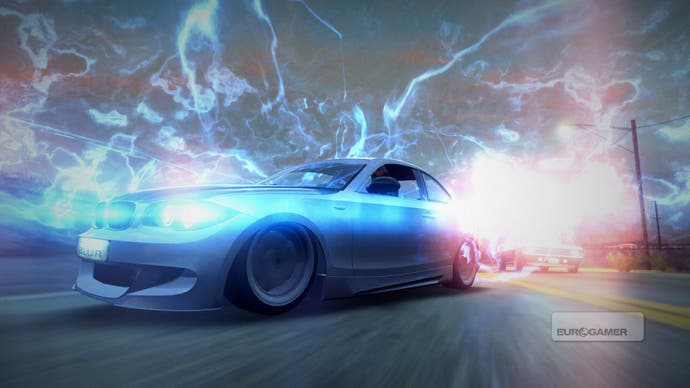Blur
Power-up to the people.
Its "linear, RPG-style" progression is organised as a fictional social network of underground racers, organised into local groups. They'll message and invite you and comment on races, as well as chipping in with some (cheesy, but not irritating) audio lines mid-race. To some extent the network is just a front-end conceit, but the groups also organised Blur into racing themes, which is where the variety of racing objectives comes in: not just winning races, but protecting friends, team racing, aiming to cause damage, stunt and style racing and so on.
To start with, in Los Angeles, you'll be focused on power-ups and combative racing. San Francisco's group favours stunts, drifts and style. The UK is focused on team racing - the Hackney track we played was a face-off between two two-man teams, with the objective being to beat your one arch-rival - while Spain is all about class A cars and raw speed. Every 45 minutes or so of gameplay you'll move on to a new chapter, and can expect the location, style and context of the racing to change.
Side-groups will appear off the linear progression, offering missions and unlocks based on your driving style. If you're aggressive, you might be offered a destruction derby; if you're fast, a time trial; if you're social, you might get access to new features in the paint editor. Tying into all this is the "fan" system, an echo of PGR's Kudos, whereby you earn fans for impressive or effective driving in a certain style.

The clever part about the social network - codenamed "racebook", but probably not for long - is that it works as a multiplayer front-end, too. Blur supports 20 players online and four-player split-screen, a very impressive effort, but its most exciting multiplayer feature is the ability to create custom groups mirroring those of the single-player games, with your own bespoke style and racing rules, perhaps offering livery unlocks as a reward. This is an attempt to embrace the creative racer culture that spawned cat-and-mouse in PGR2, and will have the filtering and rating systems and developer recommendations you expect from user-generated content.
This is central to Bizarre's hopes for Blur in the long term. "Obviously we want this to be a regular franchise, so we hope that moving forwards it's going to become a massively community-driven racing property; the final thing could be that it becomes the place where people come to effectively build their racing game," says Wilson.
The social network also serves as a more inclusive replacement for the hardcore, competitive, leaderboard-jostling community that followed PGR - influenced by the friends-list focus of Geometry Wars 2. "I think the whole leaderboard thing is a bit of a red herring," he says. "I don't think the majority of people really care that much about being number one in the world... What's going to be much more interesting is in time attack. If you're in my friends list and you do a best lap, the social network will inform me that you've just done a fastest lap on this particular track. You can send that ghost to me and go, 'Beat that, bitch,' and then I'll race it, and then I'm actually playing against someone, probably of comparable ability, who I'll actually care about beating."

Bizarre has set itself a stiff challenge with Blur: creating a content-sharing community around a racing game while simultaneously selling it into the mass market, and hopefully, taking its hardcore fans with it, not to mention going against its own internal grain, learning to let go of its historical strengths. It's scary, and not just for the studio; many will mourn the gloss, excitement and finesse Bizarre brought to real-world racing. From what we've seen of Blur, it's a confident game but one that's still some way from the near-perfection of latter PGRs.
But Blur is also tremendously exciting, because it's the work of a hugely talented studio stepping out of its comfort zone, raising its expectations, and refusing to settle for being the big fish in the small pond. "I think that space is up for the taking," says Wilson. "I think Need For Speed has lost its way. NFS Shift looks like it's just jumping on where Gotham was, it's almost like you can see them saying oh, no Gotham this year, let's do Gotham. I don't think that's the right thing to do. I think we should be going back to the reason people play racing games."
